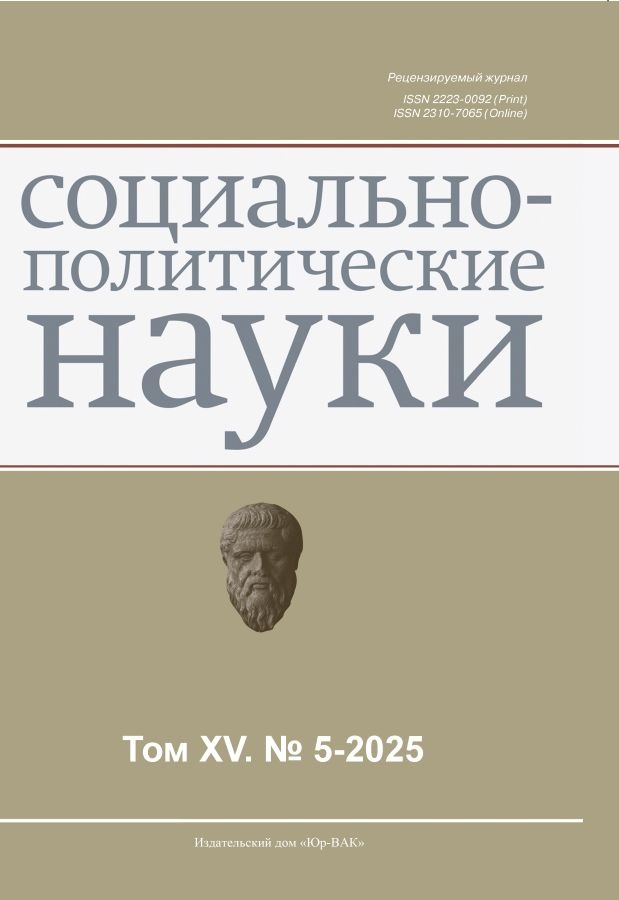Modern Political Theory on the Effectiveness of Social Policy
- Autores: Podolskiy V.A.1
-
Afiliações:
- State Academic University of Humanities (GAUGN)
- Edição: Volume 15, Nº 5 (2025)
- Páginas: 35-43
- Seção: History and Theory of Politics
- URL: https://journals.eco-vector.com/2223-0092/article/view/696682
- DOI: https://doi.org/10.33693/2223-0092-2025-15-5-35-43
- EDN: https://elibrary.ru/CDETAY
- ID: 696682
Citar
Texto integral
Resumo
The purpose of the article is to systematize approaches to assessing social policy measures. The article uses studies by Russian and foreign authors who have developed methods for measuring the effectiveness of social policy. In the existing literature, social policy was assessed by its impact on electoral support and reducing inequality, by the principles of its organization and its aims. Also, the issues of optimizing social programs in the context of slowing growth or contracting economies were studied. On the one hand, in terms of the ratio of funds spent on social programs and the results obtained, the Northern European countries are recognized in the literature as the most effective. On the other hand, the extensive government commitments typical for these countries, according to many researchers, cannot be maintained in the long term due to demographic and economic changes. The issue of effectiveness itself can be perceived differently depending on the values in society, among experts and decision makers. Proposals for improving the effectiveness of social policy in modern political theory therefore vary: some authors propose increasing redistribution in order to avoid increasing inequality, while others suggest reducing social spending to ensure their long-term sustainability.
Palavras-chave
Texto integral
Sobre autores
Vadim Podolskiy
State Academic University of Humanities (GAUGN)
Autor responsável pela correspondência
Email: deomniscibili@yandex.ru
ORCID ID: 0000-0002-1659-9025
Código SPIN: 6606-2360
Cand. Sci. (Polit.); associate professor; Faculty of Political Science
Rússia, MoscowBibliografia
- Abazieva K.G. Methodological approaches to the social programs effectiveness assessment. Terra Economics. 2011. No. 1. Pp. 55–59. (In Rus.)
- Borodkina O.I., Starshinova A.V., Arkhipova E.B. Social investment: Problems and development strategies. Terra Economicus. 2022. No. 2. Pp. 99–110. (In Rus.). doi: 10.18522/2073-6606-2022-20-2-99-110.
- Bychkov D.G., Feoktistova O.A., Andreeva E.I. Social protection and statistics: a comparative analysis of Russian and international accounting practices in an effort to assess the effectiveness of the fiscal measures in the sphere of social protection of population. International Accounting. 2016. No. 4. Pp. 35–52. (In Rus.)
- Mironova A.A. Critical review of the social investment concept. Journal of Social Policy Studies. 2024. No. 1. Pp. 171–181. (In Rus.). doi: 10.17323/727-0634-2024-22-1-171-181.
- Yakovlev L.S. On the issue of methodology for assessing the socio-economic effectiveness of social policy. In: Proceedings of the 20th national scientific conference with international participation “Russia: Trends and development prospects”. 2021. Pp. 274–278.
- Ahrens L., Bandau F. The electoral consequences of welfare state changes: A sober look at theory and evidence. Journal of European Public Policy. 2022. No. 8. Pp. 1633–1656. doi: 10.1080/13501763.2022.2096669.
- Antonelli M.A., Bonis V. de. The efficiency of social public expenditure in European countries: A two-stage analysis. Applied Economics. 2019. No. 1. Pp. 47–60. doi: 10.1080/00036846.2018.1489522.
- Bonvin J.-M., Laruffa F. Disputing the economization and the depoliticization of “social” investment in global social policy. In: The struggle for social sustainability. Moral conflicts in global social policy. C. Deeming (ed.). Bristol, 2021. Pp. 73–88.
- Cammeraat E. The relationship between different social expenditure schemes and poverty, inequality and economic growth. International Social Security Review. 2020. No. 2. Pp. 101–123. doi: 10.1111/issr.12236.
- Haelg F., Potrafke N., Sturm J.E. The determinants of social expenditures in OECD countries. Public Choice. 2022. No. 3–4. Pp. 233–261. doi: 10.1007/s11127-022-00984-4.
- Hartley T., Bergh J. van den, Kallis G. Policies for equality under low or no growth: A model inspired by Piketty. Review of Political Economy. 2020. No. 2. Pp. 243–258. doi: 10.1080/09538259.2020.1769293.
- Hasanaj V. Global patterns of contemporary welfare states. Journal of Social Policy. 2022. No. 4. Pp. 886–992. doi: 10.1017/S0047279421001033.
- Hemerijck A., Ronchi S., Plavgo I. Social investment as a conceptual framework for analysing well-being returns and reforms in 21st century welfare states. Socio-Economic Review. 2023. No. 1. Pp. 479–500. doi: 10.1093/ser/mwac035.
- Kongshøj K. Social policy in a future of degrowth? Challenges for decommodification, commoning and public support. Humanities and Social Sciences Communications. 2023. No. 1. doi: 10.1057/s41599-023-02255-z.
- Nolan B. Social investment. The thin line between evidence-based research and political advocacy. In: The uses of social investment. A. Hemerijck (ed.). Oxford, 2017. Pp. 43–50.
- Samson M. et al. Methods of measuring the impacts of social policy in political, economic and social dimensions. Geneva, 2015. 34 p.
- Steinbacher C. The pursuit of welfare efficiency: when institutional structures turn “less” into “more”. Policy Sciences. 2024. No. 2. Pp. 353–378. doi: 10.1007/s11077-024-09535-8.
- Valls-Fonayet F., Belzunegui-Eraso A., Andrés-Sánchez J. de. Efficiency of social expenditure levels in reducing poverty risk in the EU-28. Poverty & Public Policy. 2020. No. 1. Pp. 43–62. doi: 10.1002/pop4.267.
- Walker A. Ageing sustainably. In: The struggle for social sustainability. Moral conflicts in global social policy. C. Deeming (ed.). Bristol, 2021. Pp. 155–176.
- Walker C., Druckman A., Jackson T. Welfare systems without economic growth: a review of the challenges and next steps for the field. Ecological Economics. 2021. No. 186. Pp. 1–12. doi: 10.1016/j.ecolecon.2021.107066.
Arquivos suplementares









